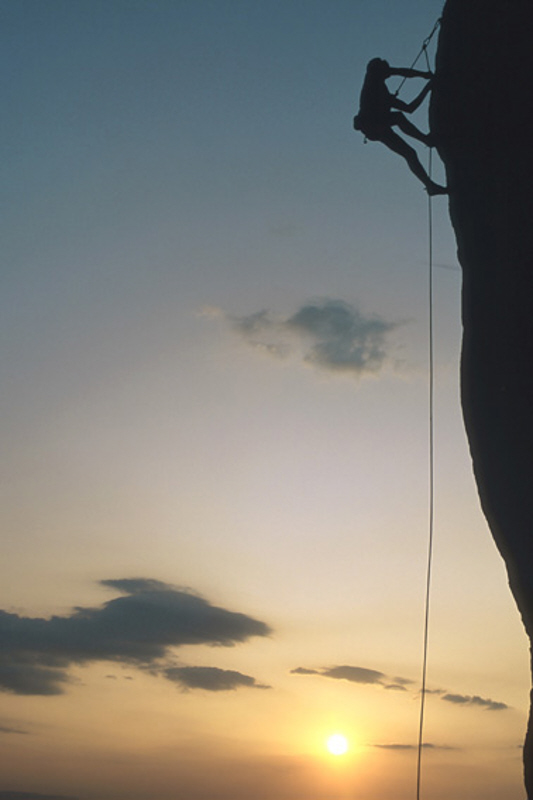Published: Thursday, March 30, 2006 at 3:15 a.m.
Last Modified: Thursday, March 30, 2006 at 12:00 a.m.
When Moses Rickett's brother took up rock climbing and lost 40 pounds
in just two months, Moses saw firsthand the effect that the love
of a sport can have on a person's body.

Click to enlarge
Frost Walker, manager of Sunrift Adventures, climbs Shortoff
Mountain in Linville Gorge in North Carolina.
COURTESY OF SUNRIFT ADVENTURES
"He lost weight in the process of doing something he loved,"
Rickett said. "Climbing was what forced him to get into shape."
Rickett is now a climber himself and works at Rocks and Ropes,
an indoor climbing facility in Greenville.
"Engaging in a physical activity like rock climbing can tip
the balance of a person's calories consumed versus calories
burned," said Professor Frank Powell of Furman University's
Health and Exercise Sciences Department. "With that kind of
exercise and moderating your diet, it's certainly possible that
it will have a significant effect."
Traditional climbing can be loosely described as the practice
of scaling long rock faces for hundreds of feet, though any
number of distances, skill levels, routes and even indoor,
fabricated climbing walls, can come into play. The difficulty of
a climb is based on the grade of the rock face, the availability
of hand and foot holds as a climber ascends, and for the
advanced climbers, the technically challenging maneuvers that
give them a chance to defy gravity.
"It's great exercise," said Frost Walker, a local climber and
manager of Sunrift Adventures in Travelers Rest. "It's very
aerobic, and there's a lot of hiking involved."
"Part of climbing is the work you have to do to get to the
rock," Powell said. "There's more to it than just intense
muscular activity. You have to hike to the rock, carry the
equipment in and carry it out."
Powell also pointed out that once they get hooked on the
sport, climbers have an extra incentive to lose weight.
"Because of the nature of climbing, a person's
strength-to-body-weight ratio is a good predictor of success,"
Powell said. "Slighter-built people do better than more
ponderous ones, so as soon as a climber starts to lose some
excess weight, they find out that they're more agile on the
rocks and making better climbs, and then they start to say, 'OK,
I've got to be more selective with my diet if I want the energy
to be able to do what I love.' "
More at
http://www.goupstate.com/apps/pbcs.dll/article?Date=20060330&Category=NEWS&ArtNo=603300328&SectionCat=LIFE


